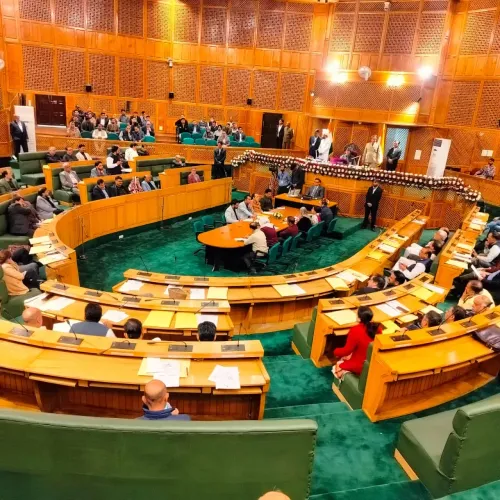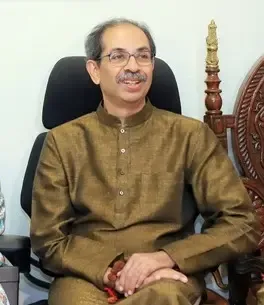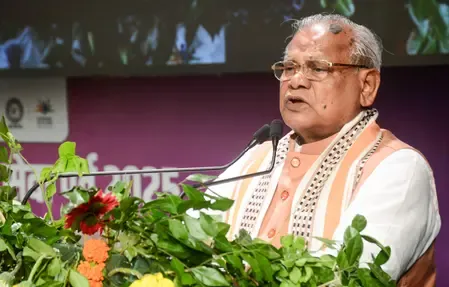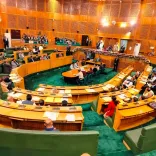Will Global Leaders Unite for a Treaty Against Plastic Pollution?
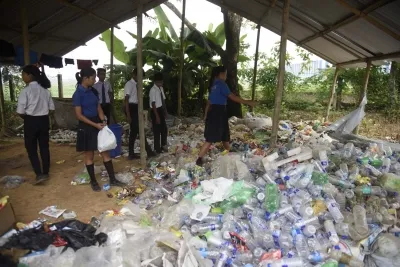
Synopsis
Key Takeaways
- World leaders are negotiating a global treaty to combat plastic pollution in Geneva.
- The treaty aims to address significant health and environmental threats posed by plastic waste.
- Developed nations are urged to assist developing countries in meeting compliance obligations.
- A strong treaty is vital to protect public health and the environment.
- Activists and civil society are demanding urgent action from governments.
New Delhi, Aug 5 (NationPress) Beginning Tuesday, leaders, delegates, and observer groups—including scientists, environmentalists, and industry representatives—from 179 countries, including India, are set to convene in Geneva for a crucial final round of negotiations aimed at establishing a global treaty to combat plastic pollution and foster a sustainable future.
This marks the resumed fifth session of the Intergovernmental Negotiating Committee (INC-5.2), which is dedicated to crafting an international, legally binding instrument addressing plastic pollution, particularly in marine environments, over the course of the next 10 days.
The United Nations has indicated that efforts are intensifying in Geneva to finalize a global plastics treaty, emphasizing that without immediate action, plastic waste could surge by three times by 2060. The discussions are geared towards creating a binding treaty that tackles threats to public health, marine ecosystems, and economic stability.
The UNEP warns that if an international agreement is not reached, plastic waste is likely to increase dramatically by 2060, inflicting severe harm—including on human health.
India's perspective emphasizes that developed nations, which generate more plastic waste per capita and bear historical accountability, must extend financial and technical support by establishing a multilateral fund. This fund would assist developing countries in meeting compliance duties.
The UNEP-led discussions stem from a 2022 decision by member nations to formulate a legally binding international framework to address the plastic pollution crisis, including in global oceans, within a two-year timeframe.
In anticipation of the Geneva summit, the medical journal The Lancet published a cautionary note highlighting that materials found in plastics pose significant health risks “at every stage of the plastics life cycle and every stage of human life.”
Over two dozen health experts cited in the journal assert that infants and young children are especially at risk. “Plastics constitute a serious, escalating, and underappreciated threat to both human and planetary health,” they noted, with health-related economic losses surpassing $1.5 trillion annually. Additionally, a coalition of more than 60 eminent scientists globally has issued an urgent appeal for governments to agree on ambitious, enforceable measures to confront plastic pollution, prioritizing human health.
The letters, published on July 28 in the Cambridge University Press journal Cambridge Prisms: Plastics, preceding the resumed session of the Intergovernmental Negotiating Committee (INC-5.2), indicate that the plastic crisis has emerged as a defining environmental, health, and social justice challenge of our era.
Leading the negotiations is Jyoti Mathur-Filipp, Executive Secretary of the Intergovernmental Negotiating Committee on Plastic Pollution, who remarked, “In 2024 alone, humanity is projected to consume over 500 million tonnes of plastic. Out of this, 399 million tonnes will ultimately become waste.”
Recent forecasts suggest that plastic leakage into the environment could increase by 50% by 2040. “The cumulative costs of damages resulting from plastic pollution could soar as high as $281 trillion between 2016 and 2040,” she stated.
Just a day prior to the final negotiations, hundreds of citizens and civil society groups from around the globe congregated at Place des Nations in Geneva, advocating for an ambitious and legally binding treaty that prioritizes people and the planet over polluters. The demonstration, organized by Greenpeace Switzerland and the Break Free from Plastic movement, alongside the Gallifrey Foundation and a growing coalition of environmental and social justice organizations, featured protesters donning yellow, red, and orange to symbolize the urgent crisis and the dangers posed by unrestrained plastic production, predominantly derived from fossil fuels.
“As the host nation for these plastic pollution negotiations, we expect Switzerland to uphold the ambitious goals of the upcoming Global Treaty. With plastic production projected to triple by 2050, the treaty is bound to fail without a universal target to curtail plastic manufacturing. We must end the plastic era to safeguard our health, communities, and planet,” stated Joelle Herin, an expert in consumption and the circular economy at Greenpeace Switzerland.
Civil society is highlighting the fossil fuel industry's role in obstructing progress and urging delegates to focus on upstream strategies that address plastic production at its source.
“During the previous round of negotiations, we identified 221 lobbyists from the fossil fuel and petrochemical sectors. If they had formed a single delegation, it would have been the largest present at the talks, eclipsing even the European Union and its member states combined (191). This overwhelming presence illustrates how threatened these industries are by a robust plastics treaty,” expressed Laurianne Trimoulla, Communications and Project Manager of the Gallifrey Foundation.
Mageswari Sangaralingam from Sahabat Alam Malaysia asserted that a strong global plastics treaty “is not merely about decreasing pollution—it represents our chance to eliminate the injustice of waste trade, ensuring that no community is relegated to being a dumping ground for another’s excess.”
(Vishal Gulati can be contacted at vishal.g@ians.in)


